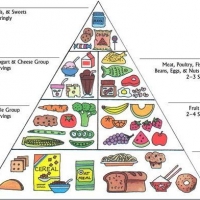The Feds and Weight Loss
It seems like new information is discovered about something every day. And the topic of weight loss and the federal government is no exception. Keep reading to get more fresh news about weight loss.
You may be surprised what the federal government has to say about weight loss. The National Institutes of Health has some interesting ideas about what it takes to trim the fat. You may find that a number of these ideas conflict with what you've been hearing in the popular press.
For instance, you may have read that consuming red meat makes it more difficult for you to shed pounds. Actually, lean meat can be a critical component of a diet. While red meat, chicken, and pork may have cholesterol and saturated fat, they also have important minerals such as iron and zinc. However, when eating meat, you should try to make sure that it is low in fat. You can choose from sirloin tip, round steak, and flank steak. You should also be aware of proper portion sizes-the average portion should be the size of a billfold folded over.
You may have heard that dairy products are fattening. However, low-fat milk, yogurt, and cheese have all the nutrients of whole milk products, with fewer calories and less fat. Dairy products are particularly beneficial for their calcium, protein, and vitamin D content. According to federal guidelines, children, teenagers, and senior citizens should have three servings of milk products each day, while adults age 19 to 49 should have two helpings daily. A serving would consist of a single cup of milk or yogurt, or 1 1/2 ounces of cheese. If you have trouble digesting milk products, consider lactose-free items. You may also be able to get your calcium from juice or salmon, and your vitamin D from juice or cereal.
The federal government maintains that becoming a vegetarian will not automatically make you lose weight. However, studies have indicated that vegetarians do ingest fewer calories than meat-eaters and tend to have lower body mass indexes. However, even as a vegetarian, you have to watch your intake of high-calorie food. Also, as a vegetarian you will have to find ways to ensure that you get plenty of iron, protein, calcium, and vitamin D, which might otherwise be missing from your diet. As a result, it is important that you select vegetarian entrees that are not only low-fat, but high in nutrition. For instance, spinach will give you iron, broccoli can provide calcium, milk offers vitamin D, eggs provide vitamin B12, whole grains offer zinc, and eggs give you protein.
You might have been told that you should not eat nuts if you want to shed pounds. In actuality, a small amount of nuts can be an ingredient of your weight loss plan. While nuts are, generally speaking, high in fat, the fat is considered a healthy kind that does not harm the arteries. Nuts can provide you with not only protein, but fiber and magnesium as well. But it is important that you eat nuts in moderation. This means consuming only about a third of a cup or less per day.
Federal health officials are firm on the idea that fasting is not a good way to lose weight. It is far better to eat regular meals, although you might opt for smaller meals than you might ordinarily choose eaten more frequently. Meals help to kick-start your metabolism, enabling it to thrive throughout the day.
If you are skeptical about a particular weight loss claim, you can check the Federal Trade Commission's website at
Does the federal government have all the answers when it comes to weight loss? Perhaps not. But it is clear that the feds have a great deal of research to back up their claims. Therefore, you should carefully consider the nutritional information that comes from federal sources. The federal government is interested in having a healthy populace; it has nothing to gain by promoting specific weight loss programs. Therefore, you can be sure that the information that you are getting from federal health authorities is information you can trust. And it could make a great deal of difference, as far as your personal weight is concerned.
The day will come when you can use something you read about here to have a beneficial impact. Then you'll be glad you took the time to learn more about Weight Loss and the federal government.
Related Articles
-
Fat Burning Furnace Blueprint
Rob Poulos, who has fought against his overweight since his childhood.
-
Weighing in on a Weight Loss Diet
If an individual does not exercise regularly, does not eat properly an
-
Ayurvedic Treatment For Weight Loss In India
Excessive weight is called as obesity. In the world today, there are m
-
Fat Burning Furnace - Free Fat Burning Guide
The Fat Burning Furnace by Rob Poulos is a weight loss program based a
-
8 Holiday Treats Under 80 Calories
-
Add Flavor to Meals Without Adding Carbs
With all of the low-carbohydrate and no-carbohydrate frenzies lately,
- DON'T MISS
- How To Exercise And Lose Weight Fast For Anyone!
- Xenical changed the feel about food and your body - onlinegenericpills
- Effective Cellulite Cream
- Diet Tactics You Must Know To Lose Fat?
- Fastest Method To Lose Weight In 7 Days
- What To Eat In The Morning
- Ayurvedic Remedies For Weight Loss, Reduce Weight Easily
- How Did Star Jones Lose Her Weight?
- The Diet Solution Program Ebook Torrent
- Can I Lose Weight By Running




